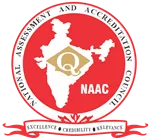- About Us
- Admission
- Academics
- Examination
- IQAC
- Research
- IIC
- Placements
- Student Support
- Anti - Ragging
- Citizenship Training
- Counselling
- Equal Opportunity Centre
- Mentorship
- Mid day Meal Scheme
- Scholarship
- Sexual Harassment (Prevention and Redressal)
- CQAC and SQAC
- Students Welfare
- Capability Enhancement and Development Schemes
- Assessing Learning Levels
- International Desk
- Student Grievance Redressal Committee SGRC
- St. Joseph's Boys Hostel - Apply
- Outreach
- Student Activities
- Infrastructure
- Sports
- Alumni Activities
Coordinator – Ms. Muktha Vision The Internal Quality Assurance Cell (IQAC), established in accordance to NAAC guidelines, aim to work towards quality sustenance and enhancement of the academic and administrative performance of the Institution.
Mission
• Developing a system for conscious, consistent and catalytic improvement in the performance of its principal stakeholders, that is staff and students of the Institution.
• Promoting innovative practices that continually improves the effectiveness of the learning experiences of students/staff.
• Upholding the goals of quality enhancement and sustenance towards organizing various activities and programmes on the Campus.
• Promoting a learner centric environment for students and staff that foster the mission and vision of the Institution.
IQAC Strategies
• IQAC promotes qualitative measures for Institutional functioning towards internalization of quality culture and best practices.
• IQAC is set up to ensure timely, efficient and progressive performance of academic, administrative and financial tasks. Steps are taken to ensure credibility of evaluation procedures and affordability of academic programs for various sections of the society.
• Qualitative steps are taken to integrate modern methods of teaching and learning to increase relevance and quality of Academics and Research programmes.
• The Cell ensures the maintenance and functioning of the support structure and services.
• The Cell promotes Research sharing and networking with other Institutions in India and abroad.
Major Initiatives of IQAC for(2015-16)
• The academic year 2015-16 witnessed the successful implementation of CBCS system. The Institution's move towards the CBCS system greatly helped the learners to choose from an array of Allied Optional subjects. The students successfully adopted an interdisciplinary approach to learning that enabled them to choose additional courses to acquire more than the required credits.
• In compliance with the Choice Based Credit System, Examination, and Evaluation reforms were initiated by the Quality Assurance Team. A ten point grading system was adopted as per UGC guidelines for the implementation of CBCS. The extension activities and extracurricular activities along with credit points were recorded in the Grade Card. Indian Constitution Examination for 2nd semester UG students were conducted online.
Answer booklets were redesigned to reduce paper wastage.
• The IQAC in its endeavour to sustain quality benchmarks and promote a culture of academic excellence organized an International Conference and an International Seminar in association with Professional Bodies. The Conference titled The Paradigm of Triple Bottom Line (TBL)-Risk, Ethics, Governance, Sustainability was conducted in association with ACCA and ISDC on 31st August - 1 September 2015. The International Seminar Tourism Sector in India, Development, Sustainability and Challenges was organized by the Travel and Tourism Department of the Institution in cooperation with FKCCI on 4th September 2015.
• IQAC organized UGC sponsored one day National seminar titled Strengthening Transparency in Higher Educational Institutions- A Quality Assurance Measure on 29th January 2016. The seminar witnessed an overwhelming response and participation.
• Taking administrative measures to strengthen various collaborations, the IQAC initiated various Partnerships with Professional Institutions, Industries and NGO’s to foster a global culture of educational excellence and to create an environment of innovative learning. This academic year the new collaborations were established with ICAI, ACCA, ISC, EDI, NSE FKCCI, Bhumi, and U&I. • The IQAC in its initiative to facilitate the creation of learner-centric environment has entered into collaboration with the following Training and Development centers.
• IMS Proschool- it is one of the foremost providers of practical financial, accounts and analytics courses in the country. It conducts training programs for Financial Modeling, Business Analytics, Management Accounting and many other Financial Reporting courses. The Institution in association with IMS proschool conducted a Financial Modelling programme for 60 Hours which included a tailored made syllabus of the following topics like Financial Management, Project Finance, Equity Research and Advanced Macros and VBA for Finance.
• Meridian Digital World- the Institution in collaboration with Meridian Digital World has set up a Center for Academic Excellence and Faculty Development with Digital Library, so that the digital material could be provided for teaching and learning process to both faculty and students alike.
• Athena Training Academy- Athena Training Academy (ATA) provides quality vocational education and training that enable a diverse student population to achieve its educational goals. The Academy trains professional in the various fields of Travel, Aviation, and Retail etc. The Institution in collaboration with ATA provides a choice of four electives papers to Travel &Tourism students.
• The IQAC of the Institution pursuing its objective to ensure the overall quality of the Institution organized an Open House on 12 January 2016 in the Conference Hall. The objective of the House was,
• To provide a platform to students to express their opinions on the pedagogical techniques, thereby strengthening the existing feedback mechanism.
• To further enhance the link between the students and the administration. • To channelize greater responsibility amongst students by their meaningful participation through the House. A Hundred students from the First Year, who come under the CBCS, participated in the discussion. Several key areas of academic pedagogy, Infrastructure, Sports and Campus life were listed down for deliberation and discussion. The programme proved highly effective and helpful in the Institution's pursuit to enhance productivity and maintain quality in all it’s the functional area.
• Aiming to evolve internal processes for analysis and assessment IQAC implemented ICT to make educational process more meaningful and students were provided the opportunity to select their electives for the final year and allied options for the second year through ERP.


